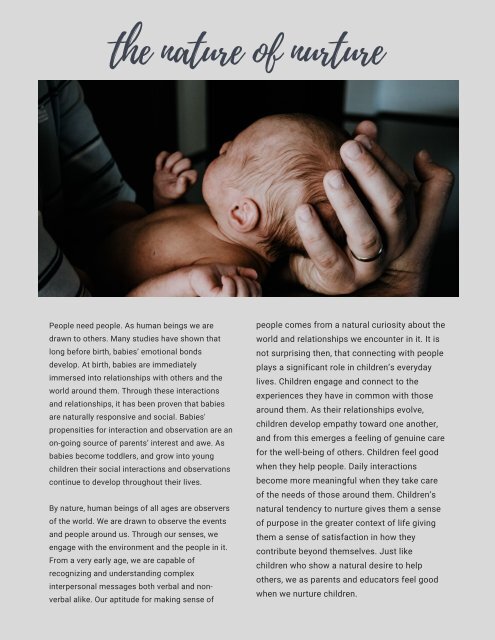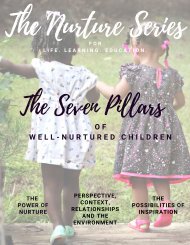The Nature of Nurture Free eBook
An eBook written for educators and parents who guide, nurture, and inspire children in life, learning, and education. Explore The Nature of Nurture and discover the philosophy behind the brand new Nurture Series eBooks.
An eBook written for educators and parents who guide, nurture, and inspire children in life, learning, and education. Explore The Nature of Nurture and discover the philosophy behind the brand new Nurture Series eBooks.
Create successful ePaper yourself
Turn your PDF publications into a flip-book with our unique Google optimized e-Paper software.
the nature <strong>of</strong> nurture<br />
People need people. As human beings we are<br />
drawn to others. Many studies have shown that<br />
long before birth, babies’ emotional bonds<br />
develop. At birth, babies are immediately<br />
immersed into relationships with others and the<br />
world around them. Through these interactions<br />
and relationships, it has been proven that babies<br />
are naturally responsive and social. Babies'<br />
propensities for interaction and observation are an<br />
on-going source <strong>of</strong> parents’ interest and awe. As<br />
babies become toddlers, and grow into young<br />
children their social interactions and observations<br />
continue to develop throughout their lives.<br />
By nature, human beings <strong>of</strong> all ages are observers<br />
<strong>of</strong> the world. We are drawn to observe the events<br />
and people around us. Through our senses, we<br />
engage with the environment and the people in it.<br />
From a very early age, we are capable <strong>of</strong><br />
recognizing and understanding complex<br />
interpersonal messages both verbal and nonverbal<br />
alike. Our aptitude for making sense <strong>of</strong><br />
people comes from a natural curiosity about the<br />
world and relationships we encounter in it. It is<br />
not surprising then, that connecting with people<br />
plays a significant role in children’s everyday<br />
lives. Children engage and connect to the<br />
experiences they have in common with those<br />
around them. As their relationships evolve,<br />
children develop empathy toward one another,<br />
and from this emerges a feeling <strong>of</strong> genuine care<br />
for the well-being <strong>of</strong> others. Children feel good<br />
when they help people. Daily interactions<br />
become more meaningful when they take care<br />
<strong>of</strong> the needs <strong>of</strong> those around them. Children’s<br />
natural tendency to nurture gives them a sense<br />
<strong>of</strong> purpose in the greater context <strong>of</strong> life giving<br />
them a sense <strong>of</strong> satisfaction in how they<br />
contribute beyond themselves. Just like<br />
children who show a natural desire to help<br />
others, we as parents and educators feel good<br />
when we nurture children.




